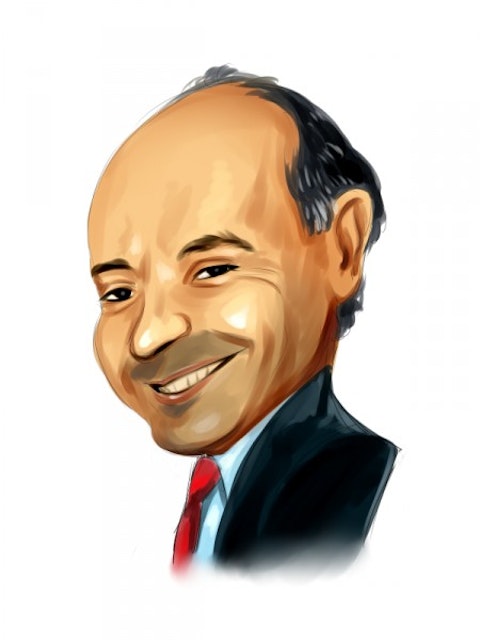In this article, we discuss 5 worst performing hedge funds of 2021. If you want to read our detailed analysis of these hedge funds, go directly to 10 Worst Performing Hedge Funds of 2021.
5. Brevan Howard
YTD Loss as of December 27, 2021: 7.4%
Brevan Howard is a hedge fund based in London. It is led by Alan Howard, a British investor with a personal net worth of close to $2.8 billion. The portfolio value of the fund, at the end of the third quarter of 2021, was around $769 million. According to Bloomberg, the flagship AS Macro Fund of the investment firm tumbled more than 4% in October, due in part to the upheaval in the bonds market. This was the worst performance for this fund since it debuted in 2017. It was also one of the reasons behind the poor performance of Brevan Howard in 2021.

Brevan Howard has invested a lot of money in Cloudflare, Inc. (NYSE:NET), a company that owns and runs a cloud platform which provides network services. Among the hedge funds being tracked by Insider Monkey, Chicago-based investment firm Citadel Investment Group is a leading shareholder in Cloudflare, Inc. (NYSE:NET) as of September 2021, with 1.1 million shares worth more than $129 million.
In its Q4 2020 investor letter, Alger Mid Cap Focus Fund, an asset management firm, highlighted a few stocks and Cloudflare, Inc. (NYSE:NET) was one of them. Here is what the fund said:
“Cloudflare. Inc. provides a broad range of network services to businesses of all sizes across the world. Cloudflare’s intelligent global network spans more than 200 cities in over 100 countries. It offers network security, performance and reliability to a growing portion of global web traffic. Today. over 15% of global internet requests go through Cloudflare. Cloudflare’s serverless network design allows this global network to be a key component layer as new developments for edge computing. 5G and Internet of Things increase the importance of secure. reliable edge networks. Cloudflare stock outperformed in the fourth quarter following the announcement of Cloudflare One, a cloud-bas. network-as-a-service platform designed to replace the traditional enterprise network infrastructure. The Cloudflare One solution merges existing Cloudflare access and security solutions along with new enterprise-specific features into a unified Zero Trust network that can be managed through a single “pane of glass.” or display screen. With the rapid shift to remote work caused by the pandemic, this product increases Cloudflare’s potential for winning business from enterprise customers seeking to adapt to this new business environment.
While Cloudflare One adoption is still early. Cloudflare has already started to demonstrate an improved ability to sell to large customers. When discussing its third quarter results. Cloudflare said that it is continuing to sign up larger enterprise customers. including its first client to generate more than $10 million in annual recurring revenue. Cloudflare has just started to better monetize its more than 100.000 paying customer base. which along with continued product innovation, gives the company strong growth potential.”
4. Element Capital Management
YTD Loss as of November 2021: 8.1%
Element Capital Management is a New York-based hedge fund led by Jeffrey Talpins. Talpins has a net worth of over $2 billion and has based the investments of Element on a global macro strategy. The investment firm had a portfolio value of $228 million at the end of September 2021. In the volatile bond market of October 2021, the fund lost around $1 billion in value, one of the worst casualties of the crisis. In the 16 years since it was founded, Element has managed average annual returns of over 18%, per Financial Times.

Jeffrey Talpins of Element Capital
One of the top investments of Element Capital Management is StoneCo Ltd. (NASDAQ:STNE), a company that operates as a financial technology solutions provider. At the end of the third quarter of 2021, 37 hedge funds in the database of Insider Monkey held stakes worth $2.2 billion in StoneCo Ltd. (NASDAQ: STNE), compared to 44 in the previous quarter worth $2.7 billion.
In its Q2 2021 investor letter, JDP Capital Management, an asset management firm, highlighted a few stocks and StoneCo Ltd. (NASDAQ:STNE) was one of them. Here is what the fund said:
“StoneCo (NYSE: STNE) has been in our portfolio since early 2019 and has appreciated 225% since. In the first half of 2021 the stock was down nearly 20% and was a drag on the fund’s performance.
Stone is a leading fintech company in Brazil that provides back-office software, loans and other financial services to small and medium sized businesses (SMBs). We have discussed Stone in past letters and the company’s “ladder up” from a card processor to a supplier of enterprise software used to sell financial products on top of such as working capital loans.
The company generates a lot of cash that it reinvests to acquire or build new financial products for its customer base. Since we invested, the company has grown the number of SMB clients by 3x, revenue by 2.3x, and net income by 2.2×11.
The pandemic’s impact on SMBs in Brazil has been severe, especially for the many retailers who are only now adopting an e-commerce strategy. In the first half of 2021 Stone increased loss provisions on its lending product, and overall growth has slowed somewhat. The stock’s decline earlier this year was not surprising, but investors are now ignoring progress that has enhanced Stone’s position for coming out much stronger when the recovery begins.
StoneCo Q1 2021 Earnings Call: “Based on (i) our learnings with lockdowns last year, (ii) recent client transactional data and (iii) learnings from the dynamics of countries where vaccines are widespread, we expect that once vaccination scale (which we think will happen in the second half of 2021), the economic recovery will be fast and – although delayed – Brazil is moving in the right direction. For these reasons, we have made an informed decision to be ready for recovery by investing in growth…”
“…In the first quarter, we decided to increase our salesforce headcount by 24%, marketing investments by 33%, customer service and logistics headcount by 32% and technology headcount by 20% in order to be the fastest player when our economy comes back to normal levels.”
“I want to start our presentation by highlighting that Brazil went through a second wave of COVID in the first quarter of ’21, which imposed commerce restrictions in several cities throughout the country. Those restrictions were felt by our clients with average TVP reaching a low in the end of March…
…But similar to the behavior we saw in the comeback from the first lockdown in 2020, we already observed significant and quick recovery with average TPV in May achieving levels above January 2021. As Thiago mentioned, we expect that once vaccinations are scaled, the economy recovery of the country will be fast.”
In terms of COVID recovery opportunities within our portfolio, Stone might be the most “coiled” because the impact on Brazilian small businesses has been so traumatic. In addition, Stone is part of a much larger and fast-moving transition happening in Brazil around the digitization of financial services. The speed of this transition is unique to Brazil because the Central Bank is actively trying to reduce the country’s previous dependency on a small handful of large banks. Important progress in the first half of 2021 included closing on the long-awaited acquisition of Linx, a mature provider of enterprise software with a large footprint across Brazil. The acquisition will provide Stone meaningful cross-selling opportunities and a more diversified customer base.”
3. Alphadyne Asset Management
YTD Loss as of November 2021: 22%
Alphadyne Asset Management is an investment firm based in New York. At the end of the third quarter of 2021, it had a small equity portfolio consisting of just five stocks, with a portfolio value of more than $157 million. The investment firm, which focuses on alternative investments, is led by Philippe Khuong-Huu. According to Bloomberg, the flagship Alphadyne International Fund lost more than 10% in July and left the firm reeling with losses of around $1.5 billion. The firm also lost money in the bond crisis of October 2021.
Since it was founded in 2006, Alphadyne Asset Management did not have a losing year on record. However, that changed in 2021. Philippe Khuong-Huu, the founder of the firm, is a former Goldman Sachs employee where he served as the chief of the global interest rate products group. By November, the losses for the firm had climbed to around 22%.
2. Rokos Capital Management
YTD Loss as of December 23, 2021: 25%
Rokos Capital Management is an investment management company based in London. It is managed by Chris Rokos, an Oxford-educated investor with a personal worth of close to $2 billion. One of the main reasons for the lackluster performance of the fund was the bond market upheaval that resulted in losses of around 18% in October alone. The 2021 performance was surprising since the fund had finished 2020, a pandemic-ravaged year, with returns of more than 44%, one of the best years for the firm on record.
A top holding of Rokos Capital Management is Taiwan Semiconductor Manufacturing Company Limited (NYSE:TSM), a firm that makes and sells integrated circuits and semiconductors. At the end of the third quarter of 2021, 67 hedge funds in the database of Insider Monkey held stakes worth $9.5 billion in Taiwan Semiconductor Manufacturing Company Limited (NYSE:TSM), up from 64 in the preceding quarter worth $10 billion.
In its Q1 2021 investor letter, Bonsai Partners, an asset management firm, highlighted a few stocks and Taiwan Semiconductor Manufacturing Company Limited (NYSE:TSM) was one of them. Here is what the fund said:
“Taiwan Semiconductor is the world’s largest outsourced foundry of logic semiconductor chips. TSMC’s shares appreciated 8.9% during the quarter.
Similar to last quarter, the supply-demand imbalance in semiconductor chips continues to benefit TSMC. To fuel new technological advances and meet the current supply imbalance, we see significantly increased capital spending across the industry over the coming years.
TSMC has an extraordinary track record of return on these large investments despite their rapid historical cadence of expansion. I remain hopeful that the large capital expenditure plan they now have ($100 billion of investment over the next three years) will be money well spent and not lead to industry oversupply in the medium term. Hopefully, future returns on these investments will look as good as those of the past.”
1. Melvin Capital Management
YTD Loss as of November 2021: 41.5%
Melvin Capital Management was one of the most high-profile casualties of 2021. The fund, based in New York and chaired by Gabriel Plotkin, was one of the hardest-hit by the GameStop short squeeze at the beginning of the year, losing billions in the saga. It was later bailed out through $3 billion given by billionaires Ken Griffin and Steve Cohen. Overall, the fund had losses of nearly $7 billion in 2021. Reports indicate that the fund is now looking to raise money for a new portfolio in 2022.

One of the top holdings of Melvin Capital Management is Mastercard Incorporated (NYSE:MA), a payments technology firm. Among the hedge funds being tracked by Insider Monkey, Virginia-based investment firm Akre Capital Management is a leading shareholder in Mastercard Incorporated (NYSE:MA), with 5.8 million shares worth more than $2 billion.
In its Q4 2020 investor letter, Bretton Fund, an asset management firm, highlighted a few stocks and Mastercard Incorporated (NYSE:MA) was one of them. Here is what the fund said:
“While consumers resumed much of their spending by summer, what and how they used their Visas and Mastercards changed. For obvious reasons, people shifted to contactless payments—one of the Covid-era changes we think is permanent—and replaced travel purchases with online shopping and food delivery. Consumers spent more on their debit cards and less on their credit cards; Visa and Mastercard make more per transaction on the latter. They also make more on cross-border transactions that come mostly from international travel, which ground to a halt early in the pandemic. Visa’s and Mastercard’s earnings per share fell by 7% and 16%, respectively, compared to their usual mid-teens growth. We’re not too worried, and we think they’ll catch up nicely in the post-vaccine world. Visa’s stock returned 17.1% and Mastercard’s 20.2%.”
You can also take a peek at 10 Undervalued Tech Stocks to Buy Now and 10 Most Successful Tech IPOs of 2021.




